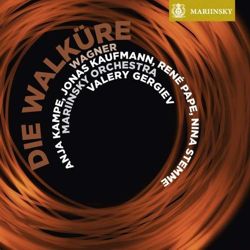|
|
|
|
|
|
|
|
|
Classicalsource |
| Reviewed by: Peter Reed |
|
|
|
Mariinsky/Valery Gergiev – Wagner’s Die Walküre |
|
|
 This
Mariinsky Die Walküre is the first release of the company’s Ring cycle. The
recording is based on concert performances that Valery Gergiev conducted.
Any misgivings I may have had regarding Gergiev as a Wagner conductor were
blown away by his superb 2009 recording of Parsifal and then by a concert
performance of it at the Barbican Hall in April 2012. In this Die Walküre
the main roles are sung by established Wagner artists, with the smaller ones
of Hunding and Fricka vividly sung by respectively Mikhail Petrenko and
Ekaterina Gubanova. The eight Valkyries are company singers – I wonder if
Natalia Evstafieva will be the Götterdämmerung Waltraute; she’s very good. This
Mariinsky Die Walküre is the first release of the company’s Ring cycle. The
recording is based on concert performances that Valery Gergiev conducted.
Any misgivings I may have had regarding Gergiev as a Wagner conductor were
blown away by his superb 2009 recording of Parsifal and then by a concert
performance of it at the Barbican Hall in April 2012. In this Die Walküre
the main roles are sung by established Wagner artists, with the smaller ones
of Hunding and Fricka vividly sung by respectively Mikhail Petrenko and
Ekaterina Gubanova. The eight Valkyries are company singers – I wonder if
Natalia Evstafieva will be the Götterdämmerung Waltraute; she’s very good.
The set’s USP will be Jonas Kaufmann’s superb Siegmund, if
anything more penetrating and tragic than he is on the Met’s Ring cycle on
DVD. The low-lying tessitura of a lot of Siegmund’s music allows Kaufmann to
explore to the full his effortless beauty of tone, his nuanced relationship
with the text and the romantic inwardness of this fatalistic role, and when
he moves into assertively tenor territory, the result is electrifying. In
Act One, initially he isn’t well matched by Anja Kampe’s rather solid
Sieglinde, but from the third scene onwards, the heaviness dissolves and the
twins go on to carve out their crucial function in the cycle with
overwhelming passion. It’s well worth listening with the libretto to get an
idea of how both singers convey its complexities with unusual and natural
ease.
After a surprisingly restrained Prelude, depicting a
storm, Gergiev establishes a sure sense of momentum in Act One, with a
wealth of detail – you can imagine his famously flickering fingers working
overtime – and the climax is shattering. Act Two is just as fine, Gergiev’s
restraint and generally spacious tempos paying huge dividends in the flow
between the three long dialogues. Gubanova has a rather pronounced vibrato
(mainly noticeable because the other singers do not) but is a suitably
outraged Fricka. As Wotan, René Pape sings with cultivated consistency of
tone, and his subtle use of quasi-Sprechgesang in the most interior passages
of the god’s ‘Narration’ is very effective. Yet, while he projects the
bitterness of the outmanoeuvred Wotan, he doesn’t approach his dark
authority and grandeur until the ‘Farewell’ of Act Three, and even there his
characterisation is bigger on love and regret than on epic despair. He’s at
his best in the finale with Brünnhilde, the softening of his fury plotted
with great care.
Some may want a bit more Valkyrian abrasiveness
from Brünnhilde than supplied by Nina Stemme, but she is mesmerising
in the ‘Todesverkündigung’, as is Kaufmann – the way he gathers Siegmund’s
hushed assertiveness, fuelling Brünnhilde’s change of mind, is
unforgettable. The warmth and generosity of Stemme’s singing make
her a particularly sympathetic Brünnhilde (and will do more so, probably, in
the last two music-dramas) and she is thrilling in the Act Three
plea-bargaining with Wotan. With a full-throttle ‘Ride of the Valkyries’ and
some sumptuous orchestral playing, this is a Die Walküre to be reckoned
with.
|
|
|
|
|
|
|
|
|
|
|
|
|
|
|
|
|
|
|